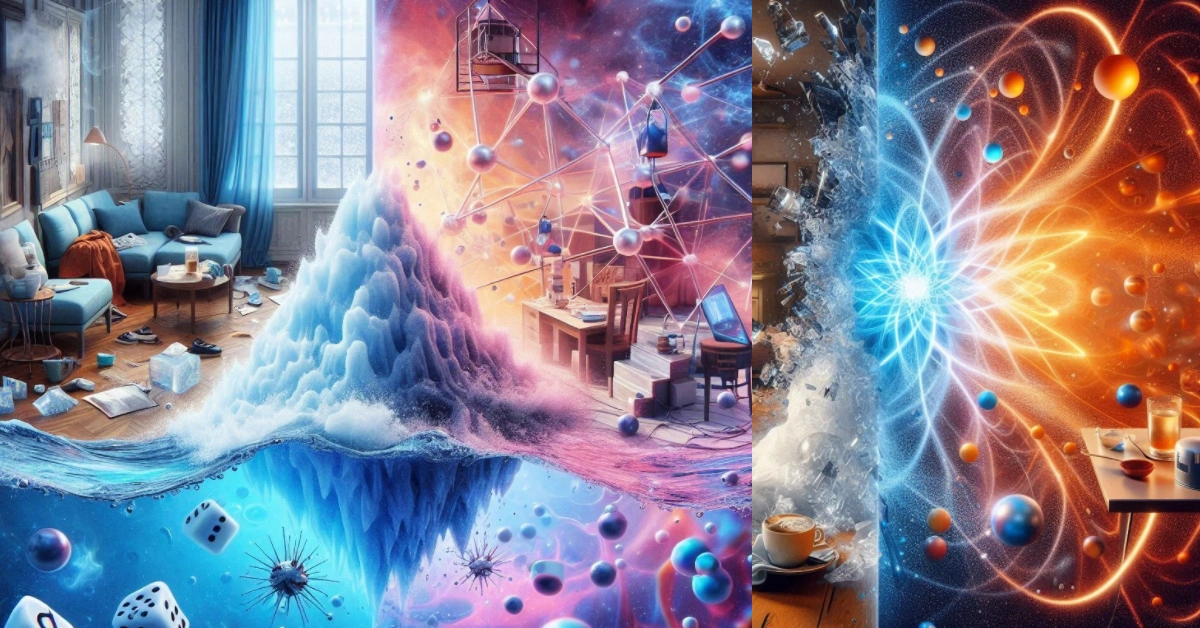For decades, physicists believed that quantum mechanics defied the second law of thermodynamics, a fundamental principle governing disorder and entropy in classical systems. However, a groundbreaking study from researchers at the Vienna University of Technology (TU Wien) suggests that entropy in quantum systems also increases over time—just in a different way than previously thought.
Table of Contents
The Second Law of Thermodynamics: A Universal Rule?
The second law of thermodynamics states that the entropy (or disorder) of an isolated system always increases over time until it reaches equilibrium. This principle explains everyday phenomena such as:
- Ice melting into water
- A tidy room gradually becoming messier
- A hot cup of coffee cooling down
- Aging and the irreversible passage of time
Entropy is often associated with chaos, randomness, and the loss of usable energy. However, quantum systems operate under different rules, leading some to believe that the second law does not apply at the microscopic scale.
Quantum Computing Breakthrough: DNA Could Replace Silicon in Future Supercomputers
Why Quantum Systems Were Thought to Defy Entropy
In the 1930s, mathematician John von Neumann published a series of papers arguing that the entropy of a quantum system remains constant over time—provided we have complete knowledge of its quantum state. His calculations suggested that quantum systems could remain perfectly ordered, seemingly contradicting classical thermodynamics.
However, von Neumann’s approach assumed a level of precision that quantum physics itself forbids. Due to the uncertainty principle and the probabilistic nature of quantum mechanics, it is impossible to have complete knowledge of a system’s state. This means the conventional approach to measuring entropy in quantum mechanics needed to be re-evaluated.
A New Perspective: Shannon Entropy in Quantum Systems
The new study from TU Wien challenges von Neumann’s interpretation by redefining entropy in a quantum context. Instead of using von Neumann entropy, the researchers applied Shannon entropy, a concept introduced by mathematician Claude Shannon in 1948.
What Is Shannon Entropy?
Shannon entropy measures uncertainty in the outcome of a specific measurement. In simple terms, it quantifies how much new information we gain when observing a system.
- If a measurement always produces the same result with 100% certainty, the Shannon entropy is zero (no new information is gained).
- If multiple outcomes are equally probable, the Shannon entropy is high (each measurement provides new information).
Applying Shannon Entropy to Quantum Systems
Consider an electron whose spin can be either up or down:
- If we already know the spin is 100% up, the Shannon entropy is zero because no new information is gained from measuring it.
- If the spin is 50% up and 50% down, the Shannon entropy is high because we gain new knowledge each time we measure the spin.
As time progresses, the entropy of the system increases, reflecting growing uncertainty. Eventually, it stabilizes at a maximum level, just like in classical thermodynamics, where entropy reaches equilibrium.
Implications: Bridging Thermodynamics and Quantum Mechanics
The study reveals that the second law of thermodynamics holds true even in fully isolated quantum systems—when entropy is measured correctly. This breakthrough unites thermodynamics with quantum physics, offering new insights into:
- Quantum information theory: Understanding entropy in quantum systems is crucial for advancements in quantum computing.
- The arrow of time: The study supports the idea that time’s forward progression is driven by increasing entropy, even at the quantum scale.
- Complex quantum systems: The findings apply not only to individual quantum particles but also to multi-particle systems with diverse possible outcomes.
Revolutionary Invention Turns Plastic Waste into Home Energy – No Solar Panels Needed!
DeepSeek: The Chinese AI Startup Disrupting the Global AI Industry
Beyond AI Hype: Three Strategic Steps to Transform Accounting Firms with Practical AI Integration
Final Thoughts: Quantum Entropy Is Real
Entropy—whether in a messy room or a quantum particle—represents a fundamental principle of the universe. The TU Wien study confirms that quantum mechanics does not violate the second law of thermodynamics; it simply follows a different type of entropy.
By redefining how we measure disorder in the quantum world, scientists are uncovering deeper connections between classical and quantum physics, paving the way for future discoveries in quantum computing, thermodynamics, and beyond.

One thought on “Quantum Entropy: How the Second Law of Thermodynamics Holds in the Quantum Realm”